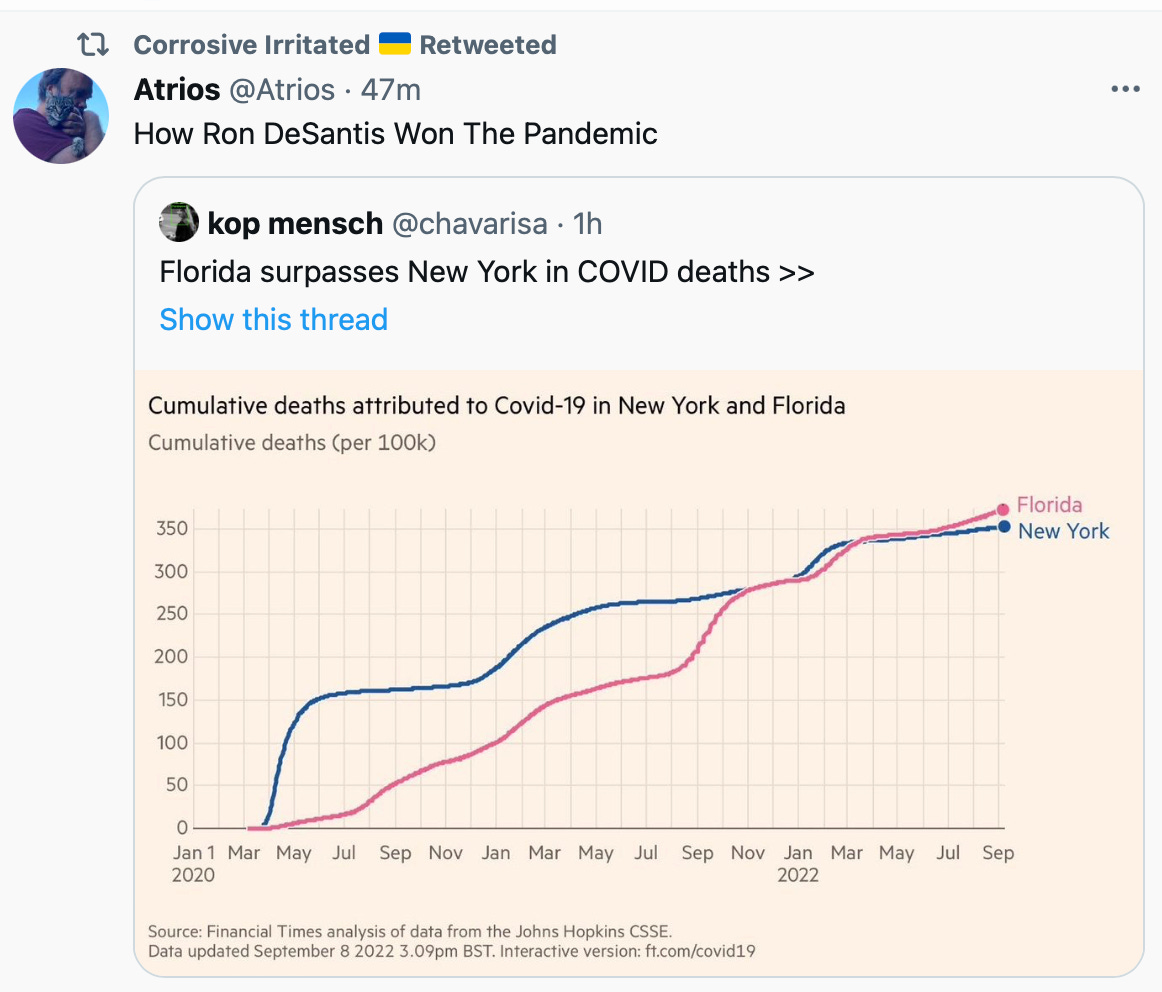FIRST: New York Times Bestselling Book Slouching Towards Utopia
Yes. The launch week debut of Slouching <bit.ly/3pP3Krk> is #6 in Nonfiction:
Far beyond my expectations and my hopes.
I would note that the Amazon rankings—bouncing between 120 and 800, with the Economist review associated with a big bump up (thank you, Ryan Avent!)—seem to me inconsistent with a #6 New York Times nonfiction bestseller ranking. I read this as indicating that the HBG sales and marketing team did an absolutely magnificent job at getting books out to real bookstores before the launch, so that people in real bookstores had a chance to pick them up last week.
Now I am both extremely pleased.
I am also quite scared.
I really do not want people who buy the book to be disappointed. But that depends on them: what kind of sub-Turing imago instantiation of my mind do they spin-up from the black squiggles on the page and then run on their wet where? Does it inform and entertain them, or not? So far my friends seem to like it, but they are my friends. With the weblog audience the channel is much more to weigh: one has a chance to revise and correct and re-orient because it is, by and large, a recurring audience that one is communicating with.
With a book, there is only one shot.
And now it is out of my hands.
One Audio:
Dan Shipper and Nathan Baschez: Ordinary Astronauts: ‘Is Apple Stuck? Plus: why focus is a lie, and a discussion of a good new book called Slouching Towards Utopia… tech, product building, and the psychology of work…
One Image:
Very Briefly Noted:
Martin Wolf: Globalisation Is Not Dying, It’s Changing: Trade in goods may be slowing, but the potential for technology-enabled trade in services remains…. Industrialisation and the revolution in transport generated opportunities for trade in goods. More recently, new information technologies allowed “trade in factories”…. Today… the broadband internet allows “trade in offices”…
Matthew Yglesias: 'Lately I’ve been reading SLOUCHING TOWARD UTOPIA, the long-awaiting economic history opus from DeLong. It is a fascinating, mind-expanding read — highly highly recommended…

Tom Barson: ‘Sharp, well-dimensioned historical vignettes are the many pleasures of DeLong’s Slouching Toward Utopia…. Full of large and small delights: big themes, piquant details, and a range of sensibility and reaction that make reading feel, at times, like a personal conversation…
The Economist: America still has an inflation problem: 'The release on September 13th showed... core prices rose 0.6% during the month, twice the 0.3% forecast.... The S&P 500... dropped by 4.4% ...
Jeremiah Johnson & Brad DeLong: The Neoliberal Podcast: Slouching Towards Utopia
Sarah Caro: ‘Great session with Torsten Bell of the Resolution Foundation talking about Slouching Towards Utopia published by Basic Books UK tomorrow (discount available on their website) Excellent convo but highlight guest appearance by Brad’s 🐕 💖…
Slouching Towards Utopia: ‘London School of Economics and Political Science: Monday 10 October 2022 6:00pm :: Hosted by the Department of Economic History :: J. Bradford DeLong & Patrick Wallis…
The Economist: Joe Biden’s industrial policy is big, bold and fraught with difficulty: 'Until now, America’s main industrial-policy programmes have been in the Department of Defence.... Nothing has been as successful as the defence industrial system, the fount of innovations that have spread to civilians, from nuclear power to the building blocks of the internet. The legislation passed under Mr Biden draws on that experience...
Eric Newcomer: What Would Steve Do? (w/Kara Swisher)
Matthew Yglesias: Let Joe Manchin have his pipeline: 'Less activist chum, more focus on stuff that matters.... NEPA review... you can… point to specific situations in which it is used to… delay things that deserve to be… delayed. But… if you want to transform the nation’s energy system, then delay is fundamentally not your friend...
Frank Fukuyama: Why Ukraine Will Win: ‘The real threat perceived by Putin was in the end not to the security of Russia, but to its political model. He has asserted that liberal democracy didn’t work generally, but was particularly inappropriate in the Slavic world. A free Ukraine belied that assertion, and for that reason had to be eliminated...
Claire Potter: Are Students A Captive Audience?: 'Constructive disagreement and classroom politics: a provocation…
Robert B. Hubbell: Thank you, Lindsey Graham!: The media… incorrectly adopted Graham’s characterization of his legislation as “banning abortion.”… The legislation… criminalizesthe procedure in all fifty states.... For states… even more restrictive and punitive provisions than Graham’s proposal... those regressive laws will remain in effect...
Duncan Black: Snoozed: '"GOP snoozed on abortion as a midterm issue, saw nightmare poll numbers. Now, they’ve awoken and are racing to redefine themselves .<https://t.co/zMWWyaYuMq>— Jonathan Allen". "Republicans achieve their top goal of several decades, oh wow how did this happen when they weren't paying attention???. One of the iron laws of DC journalism: Republicans are never responsible for the things they champion...
The Economist: America’s Republicans are not your grandparents’ conservatives: 'Daniel Hopkins... and Hans Noel.… The difference between the Republican activists’ scores for conservative senators and those from DW-NOMINATE… might be because loyalty to Mr Trump has become a proxy for conservative values, regardless of the policies the senators support...
¶s:
Stephen Greenleaf: Slouching Towards Utopia: An Economic History of the Twentieth Century: 'An outstanding work of narrative history should work like a strong magnet among iron filings, pulling diverse pieces (facts) into a coherent pattern without distorting the given shape (reality) of those diverse pieces. And this is what DeLong has accomplished.... At the beginning of the book, there are facts and figures.... But on the whole, the book is surprisingly light on figures, tables, charts, and formulas; you know, the stuff you’d expect to see from an economist. The flip side (the historian side, if you will) of this is DeLong’s narrative skill in recounting the course of events and thinking of this period. DeLong’s prose has a light touch that avoids economics jargon and avoids falling into ponderous academic prose.... I’m impressed with DeLong the historian. Not only does he write an engaging and informed narrative, but he also displays insights into the nature of the historical enterprise...
Adam Gopnik: Can’t We Come Up with Something Better Than Liberal Democracy?: 'The West’s favored form of self-government is looking creaky. A legal scholar and a philosopher propose some alternatives…. We race back to Athens... a model that “Two Cheers for Politics” (Basic Books), by the political essayist and law professor Jedediah Purdy, keeps in sight.... The dead wasteland of a procedural liberalism managed by an élite, Purdy believes, has produced a crisis that only true politics—a popular belief in the possibilities of common purpose—can solve…. He is angry at the élites.... Harvard gets hit particularly hard here: slots at Harvard College, he tells us, are bought and sold, while its Crimson meritocrats go on to staff “Democratic administrations,” the Times, and, well, The New Yorker. (Purdy was a chaired professor at Columbia Law School when he wrote the book, and, curiously, Columbia is left out of the complaint, presumably having arrived at a way of separating bold freethinkers deserving of their place from those dastardly meritocrats.)… Purdy’s faith in “collective rationality” as the spur to common action… leaves him not entirely immune to what could be called the Munchkinland theory of politics. This is the belief that although the majority population of any place might be intimidated and silenced by an oppressive force—capitalism or special interests or the Church—they would, given the chance, sing ding-dong in unison and celebrate their liberation. They just need a house dropped on their witch…. The evidence suggests, alas, that very often what looks like plutocratic manipulation really is the popular will. Many Munchkins like the witch, or at least work for the witch out of dislike for some other ascendant group of Munchkins...








"With the weblog audience the channel is much more to weigh: one has a chance to revise and correct and re-orient because it is, by and large, a recurring audience that one is communicating with."
They (and I!) have helped bash the thing into shape (however annoying that might of been), where there might have been bum stretches. Also, I've read the two previous books, and there's no reason to think there is a serious error there, or anything else.
"I am also quite scared."
I don't see any reason for it. Unless they've marketed it wrong ('A Gripping, Sordid Tale of One Man and His Obsession With Historical Economic Statistics') (the publishing industry *totally* mismarkets things like that!), there's no reason to worry that someone picking it up not understanding what they're getting (although someone surely will). They'll pitch it to the Smart Set, and the Smart Set will dutifully buy it (although I suppose it won't have as many tasty readbaits like 'abortion reduces black crime'); I have no idea if they'll get anything out of it, but if one reads the oped pages, one sometimes doesn't know how anyone gets anything out of anything including attending a Good School.
It should be fine! If it truly catastrophically fails (it seems we've passed the point of that possibly happening), I am pretty sure it'll be a failure of reading comprehension plus acts of chaos.
elm
you wrote an important book, dude, what other driving reason is there for an academic career?
Writing after cataract operation. Substitute prose for proud and guarantees a large audience.